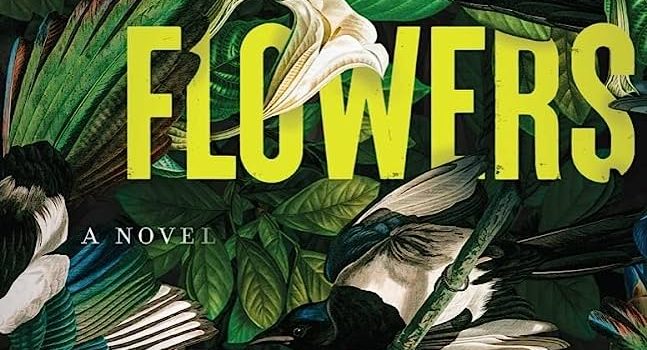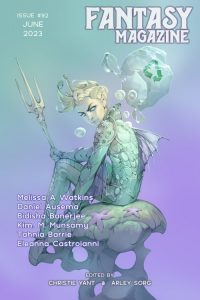Caren Gussoff Sumption Reviews The Night Flowers by Sara Herchenroether
 The Night Flowers, Sara Herchenroether (Tin House 978-1-953534-86-6, $26.95, 320pp, hc), May 2023.
The Night Flowers, Sara Herchenroether (Tin House 978-1-953534-86-6, $26.95, 320pp, hc), May 2023.
Sara Herchenroether’s debut novel, The Night Flowers, is a bit of an oddity. Part mystery novel, part police procedural, and part supernatural tragedy, it’s also a meditation on the role of fate and destiny, how someone moves beyond cancer treatment while rejecting the ‘‘warrior’’ or ‘‘survivor’’ narrative, and the various ways (still) ever-present Western societal expectations rub against independence when one identifies a woman.
In 1983, the remains of a woman and two small children are accidentally discovered by two hikers in rural New Mexico. The bodies are badly decomposed, and, in the years before DNA, the three remain unidentified and the case grows cold. However, on the thirty-year anniversary, the case attracts the attention of both the media and of Detective Sergeant Jean Martinez, an experienced officer who has just taken on the role as cold case detective for the county sheriff’s office. Jean is nearing retirement age and decides to reopen the case – long considered unsolvable – as her first (and, possibly, last) foray into the county’s backlog.
Meanwhile, thousands of miles away, 30-year-old research librarian and breast cancer patient Laura MacDonald, is undergoing a double mastectomy. To distract herself from the pain and fear of the procedure, as well as the depersonalization of being hospitalized, Laura browses unsolved crime websites, and comes across the renewed coverage of the case. Something about the case strikes a chord with her, who volunteers time using her talents in genealogy to help people locate missing family members, and she decides, after a rough recovery, to try and see if she can identify the woman and children using the same skills.
Laura’s recovery is touch-and-go, and after a near-death experience, she begins to work on the case. Quickly, she comes across a promising missing persons case that fits some of the information known about the Jane Doe and two children, and connects with a missing relative. Armed with a photo of the missing woman – who does bear a striking resemblance to the facial reconstruction of the Jane Doe – Laura travels to New Mexico to share her findings.
Jean and Laura form a fruitful partnership. Jean is impressed with Laura’s work but confused by the librarian’s dogged dedication to the case. Through Laura, we are given the driving allegory: Herchenroether is, herself, a cancer survivor, and a parallel is drawn between Laura and Jane Doe – both, through death or cancer, have lost their identity, albeit in opposite ways. Laura, going through treatment, was reduced to only her name and date of birth, repeated endlessly to one health care provider after another, while Jane Doe remained completely nameless. However, they are/were both unknown. Laura is driven to give Jane Doe back her identity.
Herein begins the supernatural elements of The Night Flowers. In shades of The Lovely Bones, we hear directly from Peggy (the deceased woman). In the limbo of the afterlife, she and her daughters, Daisy and Jo, exist in a liminal reality, both of the world, but as ghosts. Peggy is, initially, frightened by Jean and Laura’s investigation, as the killer is still alive and active, and Peggy also worries that catching the killer will somehow affect the three of them in some negative way. But soon, Peggy almost participates in the investigation, guiding and protecting the women as they close in on the killer, and throwing up clues which would – otherwise – read as ridiculous coincidences, if not directed by ghostly hands.
Peggy’s role does toe the line of too much to handle. She allows us, as readers, to be privy to details we wouldn’t otherwise know, and for Jean and Laura to have a much, much easier time untying a mystery with very little physical evidence. There are also layers and layers of connections between people in the small town, which is both understandable because of the population size, but also slightly absurd, as none of the connected people seem to know their connection. The result is a story which acts as a truly moving and elegant parallel to the experience of cancer treatment.
Characters are excellently drawn and complex. Jean and Laura are unique and well-rounded, with their own quirks, histories, and foibles. Jean has balanced – somewhat poorly – the responsibilities of being ambitious and a wife/mother, and is resistant to the ‘‘carefree’’ retirement her husband dreams of. Laura is feisty, but emotionally shut down, and wants nothing to do with the pink ribbon mythology of the brave cancer survivor. Peggy is sufficiently tragic, a victim of not only her killer, but of the time in which she lived: too restrictive for the free-spirited, open-hearted young woman she was, hidden away for a teenage pregnancy, trapped by the expectations of a very traditional father.
While readers of murder mystery may find the mystery itself a bit weak, The Night Flowers will satisfy anyone seeking a Bechdel test-passing novel with supernatural overtones and a frank look at what it means to be a survivor.
Caren Gussoff Sumption is a writer, editor, Tarot reader, and reseller living outside Seattle, WA with her husband, the artist and data scientist, Chris Sumption, and their ridiculously spoiled cat-children.
Born in New York, she attended the University of Colorado, the School of the Art Institute of Chicago, Clarion West (as the Carl Brandon Society’s Octavia Butler scholar) and the Launchpad Astronomy Workshop. Caren is also a Hedgebrook alum (2010, 2016). She started writing fiction and teaching professionally in 2000, with the publication of her first novel, Homecoming.
Caren is a big, fat feminist killjoy of Jewish and Romany heritages. She loves serial commas, quadruple espressos, knitting, the new golden age of television, and over-analyzing things. Her turn offs include ear infections, black mold, and raisins in oatmeal cookies.
[Edited to correct character name.]
This review and more like it in the July 2023 issue of Locus.
 While you are here, please take a moment to support Locus with a one-time or recurring donation. We rely on reader donations to keep the magazine and site going, and would like to keep the site paywall free, but WE NEED YOUR FINANCIAL SUPPORT to continue quality coverage of the science fiction and fantasy field.
While you are here, please take a moment to support Locus with a one-time or recurring donation. We rely on reader donations to keep the magazine and site going, and would like to keep the site paywall free, but WE NEED YOUR FINANCIAL SUPPORT to continue quality coverage of the science fiction and fantasy field.
©Locus Magazine. Copyrighted material may not be republished without permission of LSFF.









Her name is Peggy (short for Margaret ) not Betty. ☺️
Thank you! Fixed!